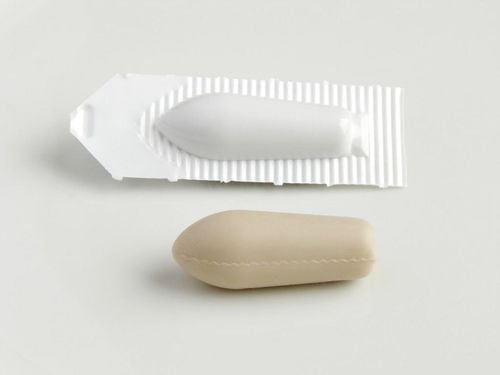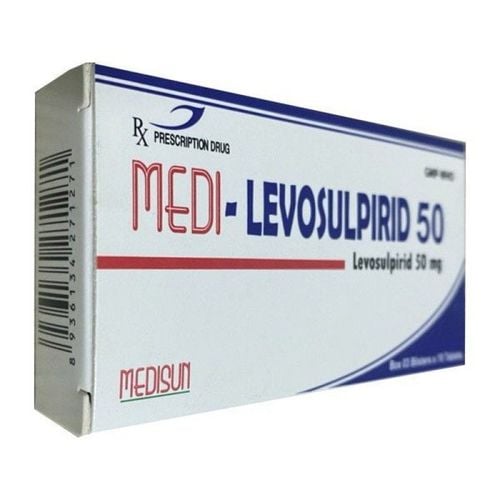Sulpiride 50mg is a medication that affects the nervous system. Its main active ingredient is sulpiride, part of the benzamide drug group, which is used to treat depression and the positive symptoms of schizophrenia (e.g., hallucinations and delusions). Let’s explore its uses and how to take it safely.
1. Uses of Sulpiride 50mg
Sulpiride 50mg belongs to the benzamide group of drugs and works by selectively targeting dopamine D2 receptors in the brain (dopamine is a chemical involved in mood and behavior regulation). In addition, it contains other excipients such as cassava starch, lactose monohydrate, povidone K30, MCC 102 (microcrystalline cellulose), talc, aerosil (colloidal silica), sodium starch glycolate, and magnesium stearate.
- At low doses: It treats depression.
- At high doses: It addresses the positive symptoms of schizophrenia.
Additionally, Sulpirid 50mg is indicated for the short-term treatment of anxiety symptoms in adults when other treatment methods have failed, including:
- Severe behavioral disorders in children, such as agitation, self-harm, or repetitive actions.
- Autism spectrum disorder.
- Acute and chronic schizophrenia.
- Tourette syndrome (a condition involving repetitive movements or vocalizations).
Sometimes, doctors might use Sulpiride for other conditions not listed here. Always consult your doctor before using this medication.
2. How to Take Sulpiride
Sulpiride is available as white or off-white round tablets. The dose depends on the patient’s condition, age, and kidney function.
For Anxiety (Short-term use in adults):
- Dosage: 50–150mg per day for a maximum of 4 weeks.
For Severe Behavioral Disorders in Children:
- Children over 6 years: 5–10mg per kilogram of body weight daily.
For Schizophrenia (Adults and children over 14):
- Positive symptoms (e.g., hallucinations): 200–400mg per dose, twice daily. Maximum dose: 1.2 grams per day.
- Negative symptoms (e.g., withdrawal or lack of motivation): 200–400mg per dose, twice daily. Maximum dose: 800mg per day.
- Mixed symptoms (positive and negative): 400–600mg per dose, twice daily.
For Tourette Syndrome:
- Ages 12–18: 100–400mg per dose, twice daily.
- Ages 6–12: 50–400mg per dose, twice daily.
- Under 6 years old: Not recommended.
For Patients with Kidney Problems:
Doses may be adjusted based on kidney function measured by level of creatinine clearance:
- Mild kidney impairment (creatinine clearance 30–60 ml/min): Take 2/3 of the regular dose or increase the time between doses by 1.5 times.
- Moderate kidney impairment (creatinine clearance 10–30 ml/min): Take 1/2 the regular dose or double the time between doses.
- Severe kidney impairment (creatinine clearance <10 ml/min): Take 1/3 of the regular dose or triple the time between doses.
You can take Sulpiride with or without food. If you experience stomach irritation, it’s better to take it with food and a full glass of water. Swallow the tablet whole; do not chew or crush it.
Always follow your doctor’s dosage and duration instructions. Do not take more or less than prescribed, and do not stop taking it without consulting your doctor.
If your condition does not improve within 7 days or new symptoms appear, contact your doctor immediately.
Do not use Sulpiride for an extended period without medical advice. Prolonged use can increase the risk of side effects without providing additional benefits. Always use this medication under a doctor’s guidance to maximize its benefits and minimize potential risks.
3. Side Effects of Using Sulpirid 50mg
Sulpirid may cause some common side effects, including:
- Tremors
- Joint stiffness
- Movement disorders (involuntary or abnormal movements)
- Overstimulation
- Extrapyramidal syndrome (a group of movement disorders, such as neck twisting, involuntary eye movement, and restlessness)
- Wheezing
- Difficulty breathing
- Slow or irregular heartbeat
- Chest pain or tightness
- Dizziness
- Palpitations (feeling your heart racing or pounding)
- Cyanosis (bluish skin due to low oxygen)
- Low blood pressure
- Increased milk production in women
- Abnormal weight gain
- Increased saliva production
- Rash
- Drowsiness
Before prescribing Sulpirid, doctors always weigh its benefits and effectiveness. However, unwanted side effects may still occur during use. If you experience unusual symptoms, especially severe allergic reactions such as intense dizziness, difficulty breathing, rash, anxiety, cognitive impairment, respiratory distress, or coma, immediately inform your doctor or nurse for urgent medical intervention.
4. Precautions When Using Sulpirid 50mg
Some important precautions when using Sulpirid include:
- Allergy history: Inform your doctor if you are allergic to Sulpirid or have hypersensitivity to any other drugs. Sulpirid may contain inactive ingredients that can cause allergic reactions or other severe problems.
- Current medications: Share all medications you are using, including prescription, over-the-counter, herbal supplements, and dietary products.
- Contraindications: Sulpirid is not suitable for certain patients.
- Elderly patients: Use caution in patients over 65, particularly those with a history of strokes, dementia, personal or family history of blood clots, kidney issues, heart conditions, manic episodes (episodes of increased activity and energy in bipolar disorder), epilepsy (recurring seizures), or high blood pressure.
- Diabetic patients: Monitor blood glucose levels in those with diabetes or at risk of diabetes when starting Sulpirid treatment.
- Genetic conditions: Be aware if you have rare genetic disorders such as galactose intolerance, glucose-galactose malabsorption, or lactase deficiency.
- Alcohol: Avoid alcohol while on Sulpirid, as it can increase drowsiness and impair driving or operating machinery.
If you miss a dose, take it as soon as possible. If it is near the time of your next dose, skip the missed dose and follow your regular schedule. Do not double the dose.
Taking too much Sulpirid may cause severe symptoms, including tongue stiffness, jaw rigidity, decreased consciousness, muscle spasms, trembling, difficulty moving, excessive salivation, dizziness, fainting, or uncontrolled movements. Seek medical attention immediately in such cases.
5. Drug Interactions
Drug interactions can reduce the effectiveness of Sulpirid or increase side effects. Inform your doctor about all other medications you are taking, including non-prescription drugs, vitamins, prescriptions, and herbal products. Do not start, stop, or change dosages of any medication without your doctor's approval.
Some medications that may interact with Sulpirid include:
- Levodopa (used in Parkinson’s disease)
- Dopamine agonists: cabergoline, quinagoline
- Sedatives or anti-anxiety drugs: morphine derivatives, antipsychotics, benzodiazepines, barbiturates, non-benzodiazepine anxiolytics (e.g., meprobamate), hypnotics, and sedating antidepressants
- Blood pressure medications: clonidine, digitalis, diltiazem, verapamil
- Antihistamines (causing drowsiness): chlorpheniramine, ketotifen, promethazine
- Medications that prolong QT interval (a heart condition that may lead to dangerous arrhythmias)
- Sucralfate (used for stomach ulcers)
- Lithium
- Beta-blockers for heart failure: bisoprolol, carvedilol, metoprolol, nebivolol
- Drugs that lower potassium levels: diuretics, laxatives
- Certain antibiotics: erythromycin, amphotericin B
- Steroids (for inflammation): prednisolone, dexamethasone, betamethasone
Always discuss with your doctor before combining Sulpirid with any of these medications to ensure safe and effective treatment.
6. How to Store Sulpirid 50mg
Store Sulpirid film-coated tablets at room temperature, below 30°C, away from light and moisture. Avoid storing Sulpirid in damp places or in the freezer, and keep it away from heat sources and open flames. Different medications have specific storage requirements, so always read the storage instructions on the packaging or consult your pharmacist.
Keep Sulpirid out of the reach of children and pets. If the medication has expired or is damaged and no longer usable, dispose of it properly. Do not throw Sulpirid into water systems, such as sinks or toilets, unless instructed to do so. Consult a waste management company or your pharmacist on how to safely dispose of Sulpirid to protect the environment.
In summary, Sulpirid is used at low doses to treat depression and at higher doses to manage positive symptoms of schizophrenia. It is also prescribed for conditions such as autism, acute and chronic schizophrenia, and Tourette's syndrome. However, Sulpirid may cause side effects and interact with other medications. Always inform your doctor about any medications you are taking to minimize side effects and enhance treatment effectiveness.
Please dial HOTLINE for more information or register for an appointment HERE. Download MyVinmec app to make appointments faster and to manage your bookings easily.













